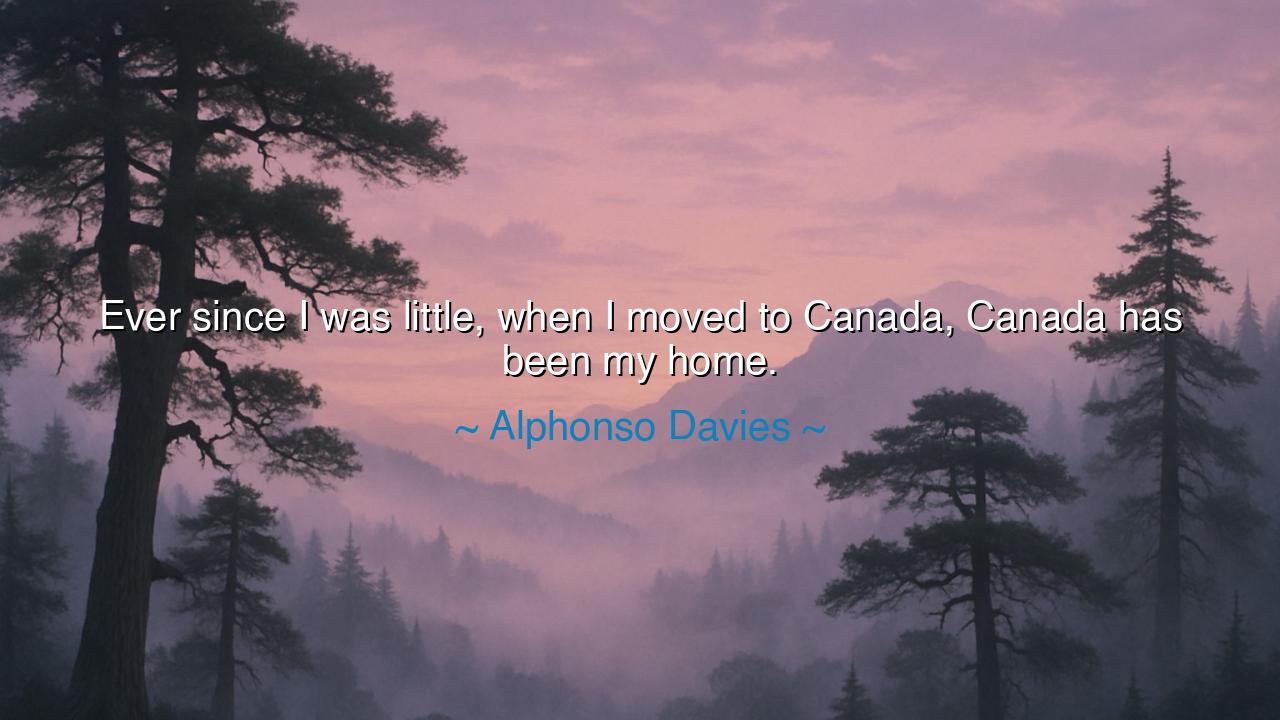
Ever since I was little, when I moved to Canada, Canada has been






In the heartfelt and noble words of Alphonso Davies, we hear the voice of gratitude, belonging, and renewal: “Ever since I was little, when I moved to Canada, Canada has been my home.” This simple statement, spoken by a young man who rose from the hardship of a refugee camp to the heights of world football, carries within it the spirit of exile and return—the ancient human story of finding one’s home not only in the land of one’s birth, but in the land that embraces one’s dreams. His words speak of more than geography; they are an anthem of identity, a hymn to belonging that transcends origin and circumstance.
Alphonso Davies was born in a refugee camp in Ghana, the son of Liberian parents who had fled the horrors of civil war. His earliest memories were not of safety or comfort, but of displacement—a childhood without a country. When his family was granted asylum in Canada, it was not just a change of address, but the beginning of a new life. For him, Canada was not simply a nation—it was a promise. It was the place where a young boy who once knew hunger and fear could learn to run freely, to play, to grow. When he says, “Canada has been my home,” he speaks not as one born into privilege, but as one who has chosen gratitude over bitterness, and who has built his identity through the shelter of kindness offered by others.
The ancients knew this feeling well. For every civilization has known exile and renewal, the pain of being uprooted and the joy of finding soil that welcomes new roots. The Hebrew prophets sang of it in their psalms beside the rivers of Babylon. The Greek hero Odysseus, after years of wandering, longed not merely for Ithaca, but for the peace of belonging. Yet Davies’s story reverses that myth: for him, it was not the return to an old homeland that brought peace, but the discovery of a new one. His is the tale of modern migration—a story not of return, but of arrival; not of reclaiming the past, but of building the future.
His words remind us that home is not only inherited—it is made. It is forged through love, memory, and shared humanity. When Davies stepped onto the fields of Canada’s youth teams, when he wore the maple leaf on his chest and sang the national anthem, he was not only representing a country; he was embodying the ideals that make one. In every goal he scored, in every moment of pride, he was repaying a debt of kindness—not with obligation, but with joy. His gratitude was his allegiance. Thus, his statement becomes an ancient truth in modern form: that the land which gives you peace, which allows you to live with dignity and hope, becomes your true homeland, no matter where you were born.
Throughout history, the idea of home has never been fixed to soil alone. The philosopher Seneca once said, “Wherever there is virtue, there is homeland.” The Romans, too, knew that belonging was more than blood—it was a bond of shared purpose. So it is with Alphonso Davies and his Canada. He found there not only refuge, but the opportunity to grow into the fullness of his humanity. It was there he learned discipline, resilience, and faith. Canada, to him, is not just a country—it is a symbol of compassion, a reminder that the open heart of a nation can change the fate of one soul, and through that soul, inspire millions.
Yet his story also carries a sacred challenge for us all. It asks: What does it mean to make someone feel at home? For the gift of belonging must not be guarded like treasure, but shared like fire. Every society, every individual, is called to become a builder of home—to offer acceptance where there is alienation, to create space for others to grow, to recognize that our collective strength lies in inclusion, not exclusion. For if a refugee child can call a foreign land his home and, through love and effort, rise to represent it before the world, then surely each of us can learn to see humanity as one vast homeland, bound not by borders, but by kindness.
So, my children of the future, take heed of this teaching: home is not found—it is made, through gratitude, compassion, and shared purpose. Let the example of Alphonso Davies remind you that the measure of a nation, and of a person, is not in the walls they build, but in the arms they open. Carry with you the spirit of the wanderer who, upon finding peace, transforms it into service. And wherever life may take you—whether among strangers or kin—remember that the truest home is built not with wood or stone, but with love that endures. For in the end, the one who learns to create belonging for others will never again be homeless in this world.






AAdministratorAdministrator
Welcome, honored guests. Please leave a comment, we will respond soon